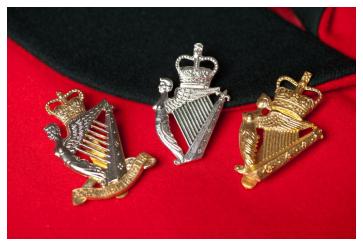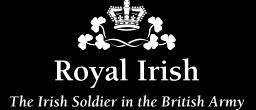Army Act 1992, legislation for The Royal Irish Regiment

|
| The new Royal Irish Regiment cap badge (centre) with Rangers (left) and UDR (right). |
The Parliamentary Under-Secretary of State, Ministry of Defence (The Earl of Arran) introduced the second reading of the Army Bill to the House of Lords by beginning his statement as follows:
'The purpose of this short Army Bill is a simple one. Its provisions are solely designed to enable the merger of the Royal Irish Rangers and the Ulster Defence Regiment to take place on 1st July.
We believe that the merger is very much in the interests of both the regiments concerned. In particular, it should greatly assist the efforts of the security forces to protect all the law-abiding citizens of Northern Ireland against terrorism from either side of the community.
Planning is now going ahead for the merger to take place on 1st July, which is of course the anniversary of the Battle of the Somme. Both regiments will welcome the enactment of this Bill in good time for the merger to proceed, and for new terms of service and other important matters to be settled.
For more than 20 years now members of the Ulster Defence Regiment have made a most courageous and distinguished contribution to the work of the security forces in Northern Ireland. All of them join the UDR at considerable personal risk, and the risks are ever-present—continuing, indeed, after they leave the regiment. Over 240 of them have been killed, and many more have sustained terrible injuries. We pay tribute to the dedication and bravery that the UDR displays day in and day out and often in ways which do not receive public attention.'
He concluded his statement by saying:
'In summary, this Bill provides the statutory framework to enable us to proceed with the regimental merger on the planned date of 1st July, thus bringing the UDR more fully into the regular Army. The Royal Irish Rangers will bring to the new regiment the proud record of service over 300 years of several predecessor Irish regiments. Although much younger, the UDR has developed its own distinctive tradition of local service to the community. This will also be retained, and enhanced, in the new regiment.
We believe that the Royal Irish Regiment, with its dual home and general service responsibilities will command the respect of people of both traditions throughout Northern Ireland'.
The Bill received Royal Assent on 16 March 1992, whereupon it became the Army Act 1992 and came into force on 1 July 1992.





